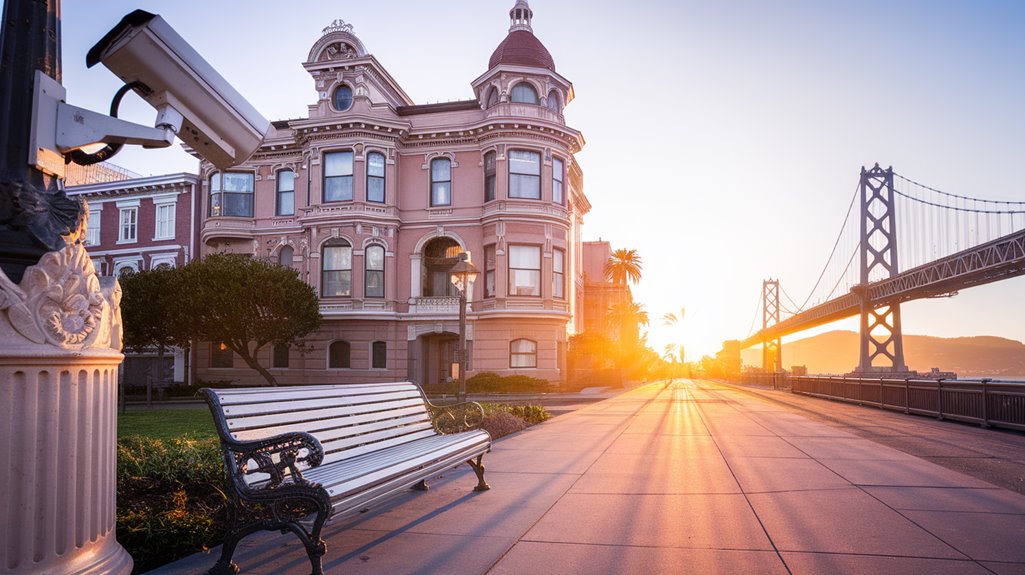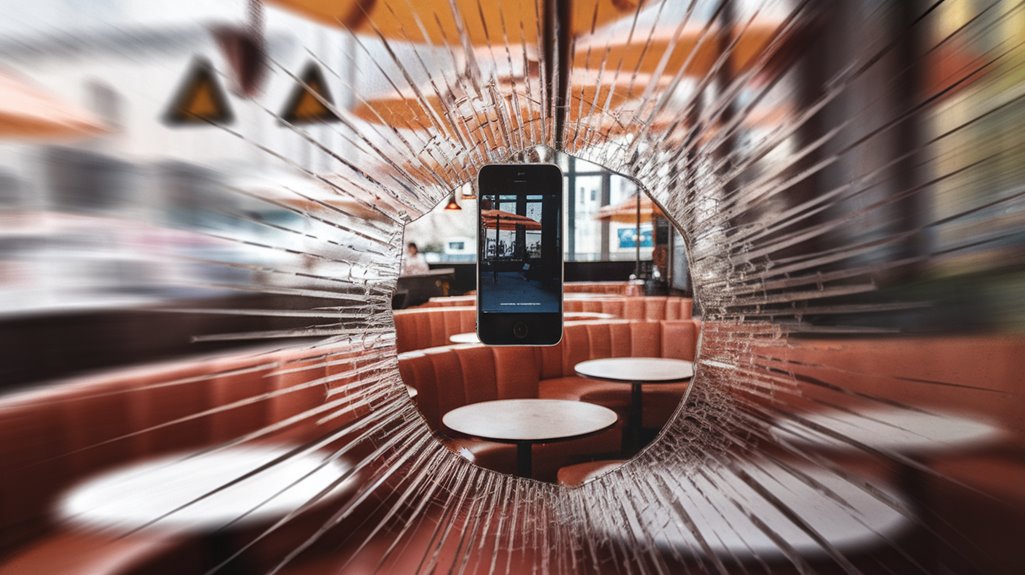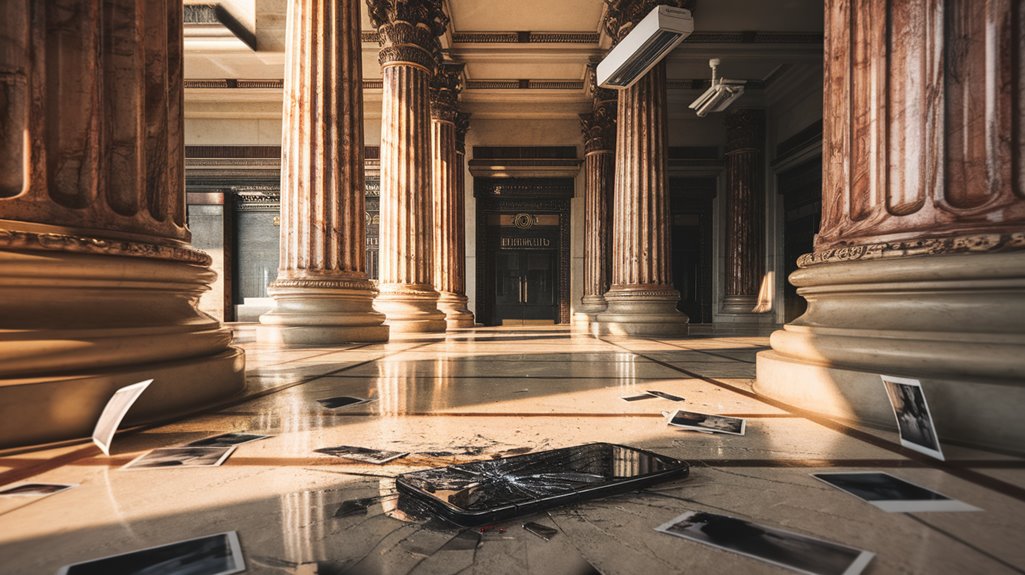Bay Area residents face legal risks when taking and sharing selfies. California law requires consent for photos in private spaces like bathrooms and changing rooms. Commercial use of group selfies needs written permission from all visible people. Sharing without consent can result in fines and jail time, especially for explicit content or photos of minors. Social media platforms must address harmful content quickly. Understanding these laws helps avoid serious consequences that many don't expect.
Key Takeaways
- Taking selfies in private spaces like bathrooms or changing rooms without consent is illegal in California and can result in jail time.
- Commercial use of group selfies requires written permission from all identifiable individuals, especially crucial for Bay Area influencers and businesses.
- Hidden camera usage for non-consensual photos in the Bay Area carries penalties of up to six months jail and $1,000 fines.
- Sharing selfies containing minors requires special protection and parental consent, with potential felony charges for explicit content.
- Social media platforms must respond to harmful content reports within 24-48 hours under California law, including unauthorized selfie distribution.
Privacy Laws and Public vs. Private Spaces

Photography enthusiasts should understand the fundamental distinction between public and private spaces when taking selfies. In California, taking photos in public space areas like streets, parks, and plazas is generally legal, even without getting permission from people who might appear in the background.
However, the rules change completely for private space locations. Bathrooms, bedrooms, and changing rooms are strictly protected by law, requiring explicit consent before any photography can occur. This applies even if someone has permission to be in these private areas – having access doesn't grant the right to take photos or videos.
Bay Area residents need to remember that violating these privacy boundaries can lead to serious legal consequences, regardless of whether the photos are for personal use or social media sharing.
Commercial Use and Copyright Considerations
Taking group photos raises complex ownership questions when any participant wants to use the image commercially on social media. Companies must obtain proper releases and permissions before using customer photos for advertising, even if those photos were publicly shared on platforms like Instagram. Influencers and brands need explicit written consent from everyone visible in a photo before using it for paid promotions or endorsements, regardless of who originally captured the image.
Group Photo Ownership Rights
When multiple people appear in a photo, questions of ownership and commercial usage rights become legally complex. While the photographer typically owns the copyright, group photo ownership can get complicated if participants make creative contributions that considerably alter the work.
Commercial use of group photos requires explicit permission from all subjects to avoid copyright implications and potential legal issues. This is especially important for advertising campaigns and brand promotions. Even when photos are shared on social media platforms, the original copyright remains with the creator – posting doesn't transfer ownership rights to the platform or other users.
To prevent disputes, photographers and subjects should establish clear agreements before publication. These can include licensing terms, usage rights, and specific permissions for commercial purposes.
Social Media Profit Rules
Social media platforms have transformed selfies from casual snapshots into potential revenue streams, bringing new legal complexities for commercial use. When engaging in influencer marketing and content monetization, users must navigate strict legal requirements to avoid costly violations.
Key commercial use rules include:
- Business accounts are mandatory for commercial activities on social platforms
- Explicit permission is required before using user-generated content in ads
- Copyright licenses must be obtained for third-party content monetization
- Fair use exemptions do not apply to commercial activities
- Rights of publicity require consent from anyone featured in monetized content
Violations can result in penalties up to $150,000 per infringement, making it essential for creators and brands to understand these regulations before profiting from social media content.
Brand Endorsement Requirements
Brands maneuvering endorsement requirements face a complex web of legal obligations that govern commercial content and copyright permissions. When engaging in brand partnerships, companies must secure explicit rights to use any user-generated content, whether through contests, hashtag campaigns, or direct permissions.
Influencer contracts need clear terms about content ownership and usage rights to prevent copyright violations. Brands can't simply repost content that includes their products or logos without proper authorization, as this could lead to legal issues over implied endorsements. Even when users tag or mention a brand in their posts, companies must obtain specific consent before using that content commercially. This applies to all forms of social media content, including photos, videos, and captions shared by customers or influencers.
Social Media Platform Responsibilities
Social media platforms must respond to harmful content reports within strict timeframes, typically 24-48 hours under current regulations. Platform liability has expanded considerably under AB1836, requiring companies to actively monitor and prevent dangerous selfie-related behaviors or face steep penalties. New deepfake detection systems allow users to flag manipulated images, with platforms required to investigate and remove confirmed fakes within one business day.
Content Removal Time Requirements
When it comes to harmful selfie content, major platforms must follow strict timelines for removing problematic posts. Content removal data shows social media companies are increasingly proactive in addressing user privacy concerns before issues get reported.
Current platform performance for rapid content removal:
- TikTok leads with 92.4% proactive removal rate, catching most violations before viewing
- Facebook achieves 89% overall, with near-perfect rates for serious violations
- Instagram removes 86% of prohibited content before user reports
- Twitter catches 77% of problematic posts early, limiting most to under 100 views
- YouTube identifies and removes 74.1% of violations proactively
These metrics demonstrate how platforms are working to protect users through automated detection systems and swift removal processes, though there's still room for improvement across all services.
Platform Liability Under AB1836
Building on platform content removal practices, California's AB1836 law introduces strict new requirements for social media companies handling digital replicas and AI-generated content.
Platforms face significant risks when distributing digital replicas of deceased individuals without estate consent. The law sets a minimum penalty of $10,000 for unauthorized use, though certain exemptions exist for news reporting, commentary, and parody. Commercial exploitation requires explicit permission from rightsholders, including estates and heirs.
The law affects any platform with California users, regardless of where the company is based. To comply, platforms must implement AI detection systems, provide user reporting tools, and act quickly on content violations. During election periods, additional restrictions apply to prevent misinformation within 60 days before and after voting dates.
Deepfake Reporting Mechanisms
Modern platforms face mounting pressure to implement extensive deepfake reporting systems under new federal and state regulations. The surge in deepfake ethics concerns has led to strict requirements for social media companies operating in California and New York.
Key reporting mechanisms platforms must now provide:
- 48-hour takedown timeline for non-consensual intimate images
- Accessible tools for users to flag digital identity theft
- Clear disclosure systems for AI-generated content
- Streamlined processes to report synthetic media violations
- Specific channels for reporting electoral deepfakes
These reporting challenges are particularly relevant as platforms navigate complex state laws like SB 981 and S1042A. Social media companies must now balance user privacy protection with efficient content moderation, ensuring their reporting systems meet both federal and state compliance standards.
Deepfake Technology and Legal Protections
As deepfake technology grows more sophisticated, legal frameworks struggle to keep pace with the challenges of digital impersonation. Current regulations focus on protecting individuals from non-consensual content creation and distribution, with states like California leading enforcement efforts.
| Legal Protection | Current Status | Key Challenge |
|---|---|---|
| State Laws | Limited Coverage | Jurisdiction Issues |
| Federal Acts | Proposed Only | Enforcement Gaps |
| Platform Rules | Varied Standards | Detection Limits |
The deepfake implications extend beyond privacy concerns to intellectual property rights and defamation risks. While detection tools continue to evolve, legal frameworks remain inconsistent across jurisdictions. Victims can pursue civil remedies through tort claims and content removal requests, though procedural limitations and costs often create barriers to justice. Tech companies increasingly implement self-regulation measures, but thorough protection requires coordinated legal responses.
Group Selfies and Consent Requirements

The legal complexity of group selfies presents unique challenges beyond individual photo consent. While taking photos with friends may seem harmless, California law requires clear permission from each person, as group consent doesn't override individual rights. This becomes especially important when sharing on social media or using images commercially.
Key consent requirements for group selfies:
- Each identifiable person must provide separate consent
- Commercial use requires written permission from all subjects
- Participants have the right to revoke consent at any time
- Special protections apply for minors in group photos
- Sharing on social media may need renewed consent
Recent court cases have established that platforms can face liability for hosting unconsented group content, with fines ranging from $750 to $7,500 per violation.
Criminal Penalties for Misuse
Despite their casual nature, selfies can lead to serious criminal charges when misused under California law. Taking or sharing photos without digital consent can result in jail time and hefty fines, especially if captured in private spaces or distributed maliciously.
California's criminal code treats various selfie-related violations as misdemeanors. Using hidden cameras to take non-consensual photos can lead to six months in jail and $1,000 in fines. Proper selfie etiquette isn't just about being polite – it's legally required. Sharing explicit photos without permission, known as revenge porn, is also a criminal offense.
The stakes are even higher for minors. Even self-taken explicit photos can trigger felony charges under child pornography laws. Vehicle-based distribution of inappropriate photos carries additional penalties of up to $2,500.
Right of Publicity in California

Under California law, right of publicity protects individuals from unauthorized commercial use of their identity. Both celebrities and regular people have publicity rights, though famous people often find it easier to prove commercial harm. The law covers photos, names, voices, and other identity elements.
Key aspects of California publicity rights include:
- Protection lasts during life and 70 years after death
- Minimum damages of $750 or actual losses, plus profits from misuse
- Two-year time limit to file claims after discovering misuse
- News, public affairs, and artistic works are exempt
- Celebrity protections extend to heirs through the Astaire Act
These rules matter for selfies because posting someone else's photo for commercial purposes without permission could violate their publicity rights, leading to legal consequences.
Legal Remedies for Unauthorized Use
When unauthorized use of selfies occurs, individuals have several legal remedies available to protect their rights. The first step often involves directly contacting the infringer to request removal or proper attribution of the image. If that fails, victims can pursue formal injunction procedures through DMCA takedown notices or civil lawsuits.
A damages assessment helps determine the appropriate legal action. For commercial misuse, individuals can seek actual damages based on lost revenue or reputational harm. Punitive damages may apply in cases of intentional misuse, like manipulated photos used for defamation. California residents should document all unauthorized uses through screenshots and communication records. While public figures face higher burdens of proof, they can still protect against commercial exploitation of their images. Mediation might be suitable for minor cases to avoid costly litigation.
Frequently Asked Questions
Can Employers Legally Require Selfies as Proof of Working From Home?
While employers can implement remote work policies that include verification methods, requiring selfies exists in a legal gray area. Employee privacy laws, especially in California, restrict collecting and sharing photos without explicit consent. Employers must consider alternative verification methods to avoid potential discrimination claims and privacy violations. A better approach involves focusing on measurable work output and using standard time-tracking tools rather than photo documentation.
Do Street Performers Have Special Rights Regarding Tourist Selfies With Them?
Like a street artist's invisible stage, performance rights create boundaries tourists should respect. Street performers generally have the right to control their image and can require consent or payment before photos are taken with them. While public spaces allow photography, performers may set their own rules about selfies during their acts. Common courtesy suggests asking permission first and respecting their wishes if they decline.
How Long Can Schools Legally Retain Student Selfies Used for ID Cards?
Schools have no set federal timeline for retaining student ID photos under FERPA. Most institutions keep these images for the duration of enrollment plus 3-5 years after graduation, though policies vary by state and school district. Student privacy concerns have led many schools to create their own photo retention guidelines. Students or parents can request deletion of ID photos and opt out of sharing them, though this may affect access to certain school services.
Are Selfies Taken During Medical Procedures Protected by Different Privacy Laws?
Selfies taken during medical procedures are strictly protected under HIPAA privacy laws, requiring specific medical consent before any sharing or use. These photos are considered protected health information, even if a patient takes them. Privacy expectations are much higher for medical selfies compared to regular photos. Healthcare providers must get explicit permission to use such images, and unauthorized sharing can result in serious legal penalties.
Do Drone Selfies Have Different Legal Restrictions Than Ground-Based Photos?
Drone selfies face markedly stricter legal restrictions than ground-based photos. Drone regulations require FAA registration for devices over 0.55 pounds, and operators need special licenses for commercial aerial photography. While regular selfies can be taken freely in public spaces, drone photos must follow specific rules about altitude limits, line-of-sight requirements, and no-fly zones. Additionally, drone operators must consider privacy laws regarding property overflights that don't apply to ground-based photography.
Conclusion
Bay Area residents should carefully consider legal implications before posting selfies online. A recent Stanford study found that 73% of social media users were unaware of basic privacy rights regarding their personal photos. While selfies are a fun way to capture memories, understanding consent requirements, commercial restrictions, and privacy laws helps protect against costly legal issues and unwanted image misuse in California’s tech-centric environment. Failure to understand these laws can lead to serious consequences, especially when images are used without permission or in legally restricted ways. In some cases, individuals have faced lawsuits or penalties for violating privacy regulations, similar to how repeated offenses can result in house arrest for fifth DUI violations. Staying informed about digital rights ensures that social media users can share content responsibly while avoiding legal trouble.
